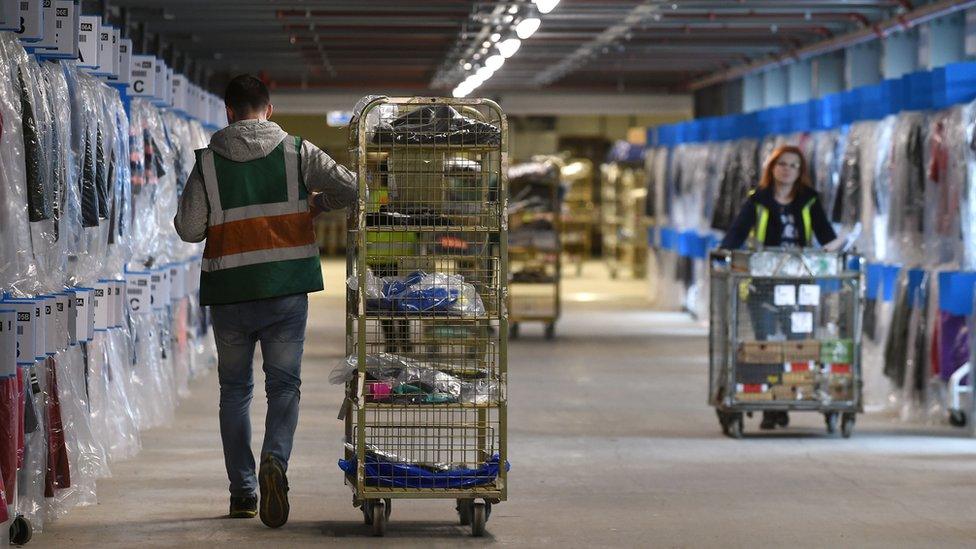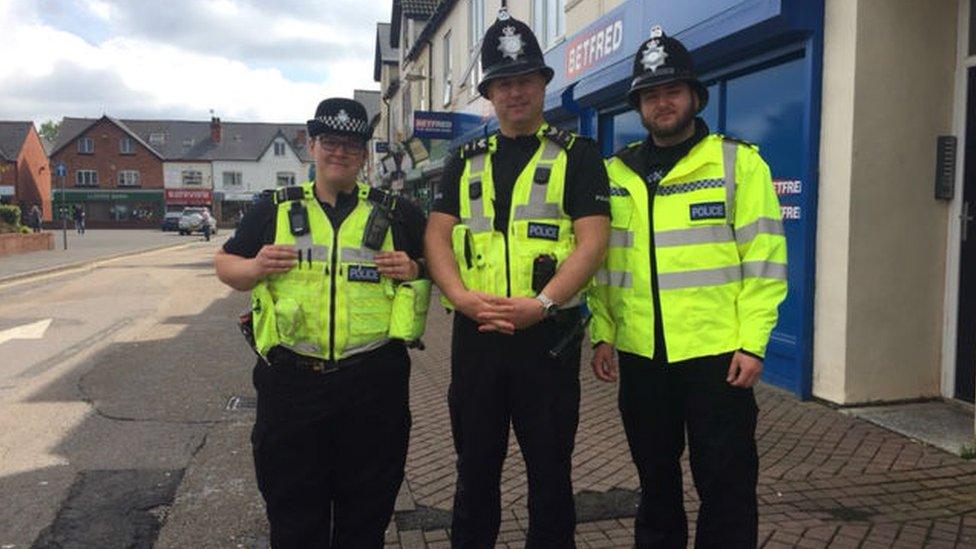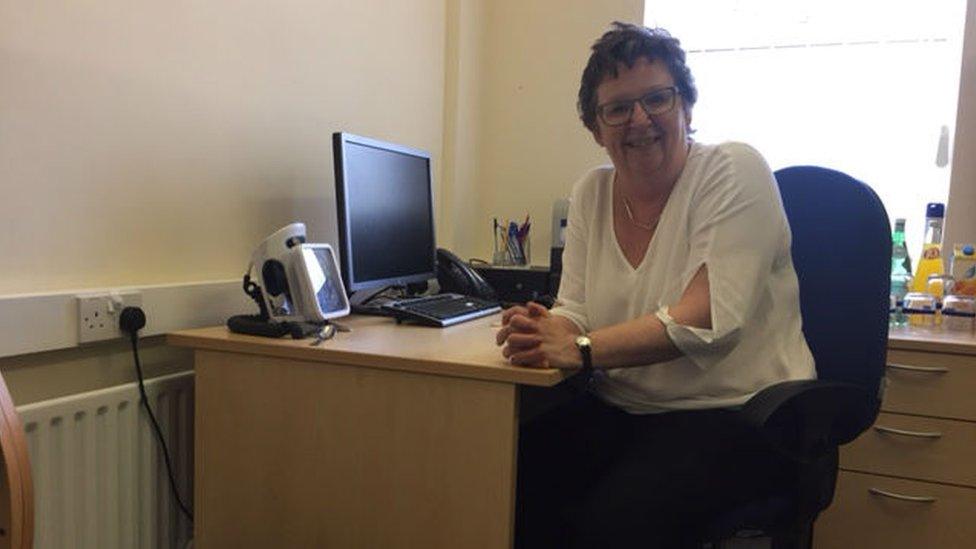How Sports Direct and migrant labour changed Shirebrook
- Published

Sports Direct set up its warehouse complex on the outskirts of Shirebrook some 10 years ago
John Humphrys revisits Shirebrook in the East Midlands which, 10 years ago, saw the arrival of large numbers of workers from Eastern Europe.
For generations immigration to the United Kingdom conjured up images of black and Asian people getting off boats and planes, finding their way to our great cities, setting up home in areas where many thousands of their compatriots were already settled.
Many people worried that those areas became ghettoes, their inhabitants either unwilling or unable to integrate into the wider society.
More recently, the immigration crisis (if that's what it really is) has taken on quite literally a different hue.
The immigrants are white and they come not from the subcontinent or sub-Saharan Africa but from the European Union.
Those who worry about them are concerned not so much for the effect they have on our culture and the cohesion of British society or the British way of life as for their economic impact.
The front line of this relatively new wave of immigration is made up not so much of the big cities - London and the great northern mill towns - as of small towns, of which most of us had probably never heard.
Shirebrook is perhaps the perfect illustration.

Sports Direct attracted migrant labour from Eastern Europe to its warehouse complex
It achieved a certain level of fame - or perhaps notoriety would be a better word - when Sports Direct set up its vast warehouse complex on its outskirts some 10 years ago.
They needed cheap labour and they brought it in from Eastern Europe.
What began as a trickle became a flood. Week after week trainloads of immigrants - almost all of them young men unable to speak English - arrived at the little train station in the centre of the town.
It did not take long before stories began to emerge of the effect this influx was having on what had been a quiet, slightly down-at-heel market town that like so much of this part of the East Midlands, had never recovered from losing its mining industry.
Reports began appearing first in the local press and then in the national newspapers of the way the immigrants were behaving.
We were told they were getting drunk in public, urinating in the streets and increasingly becoming involved in serious violent incidents. There were a couple of cases of people being stabbed.
Sticky tape
I first went to Shirebrook for the Today programme in the closing weeks of the referendum campaign in June last year, and what struck me almost immediately was that local people were at best uneasy and at worst afraid of what was happening to their town.
There were few obvious signs that anything much had changed - more men than you might expect wandering around in the middle of the day by themselves or in small groups, a couple of shops selling Polish food and, rather bizarrely, sticky tape stuck on windows.
The explanation for that? These were so-called HMOs - houses of multiple occupation.
Where once the property would have been occupied by a single family, the tape was a boundary marker separating each room into two, or even three, spaces and the house might have as many as 10 or a dozen single men living in them.
Local people were genuinely worried for the future of the town where most had lived all their lives - and that's why I've just been back.
My first impression? Things were remarkably calm. I discovered that a lot has happened in a short time. There was a much stronger police presence.

Shirebrook's streets are quieter with more police patrols and fines for people causing a nuisance
Sergeant Mark Church, who is in charge of the team, told me they patrolled the streets more regularly and they had also introduced public spaces protection orders, which meant people could more easily be fined for making a nuisance of themselves.
He also said a couple of young men who have been involved in more serious crimes had been sent back to Poland.
So the streets are, undeniably, quieter than they had been, and everybody I spoke to acknowledged that.
The town is changing in other ways, too, and maybe the most obvious sign of that - and indeed the most encouraging - was what has happened to the local academy.
In the early days of the immigration influx staff had struggled to accommodate children who spoke no English, so they set about teaching them. In one case, at least, the effect has been extraordinary.

As a new immigrant Jakub spoke no English but is now head boy at his school
Jakub couldn't speak a word of English a couple of years ago when he arrived from Poland as an immigrant. Now he is fluent.
Even more remarkable, he is the head boy of the school - elected by the very children who were once so nervous of all the new immigrants.
It was impossible not to be impressed by Jakub - not least because of his grasp of the local vernacular.
To hear a Polish teenager saying "Ey-up, me duck!" as though he were born to it is a bit startling, to say the least.
There is a problem for the school because, as the headmaster told me, he gets no extra funding to pay for any new teachers for those learning English as a second language.
But he clearly regarded it as a price worth paying - and it's hard to argue with that. Integration begins with the children who form a bridge between their parents and the local community.
So far, so good. But there is a darker side.
'Better treatment'
It was slightly dismaying that I could find no Poles who were willing to talk to me about their life in Shirebrook. Indeed, three of them pulled out of pre-arranged interviews.
Polish shopkeepers and the Polish man who ran the burger van in the market square were unfailingly charming but were clearly afraid of being quoted lest their words be twisted and came back to haunt them.
One of the great clichés of broadcast journalism is the vox pop. It sounds simple and it usually is: you just stop someone in the street, stick your microphone under their noses and off they go.
In the market square it took me about 30 seconds to find local men who, unlike the Poles, were very anxious indeed to put their views on the record.
They all insisted they were not racist but their concern was quite simply that the immigrants were given better treatment than they themselves were receiving.
One example was what happens at the doctors' surgery. They assured me that the Poles had a much better chance of getting an appointment when they wanted one than they did.
Another story going around was that there was actually a special day set aside for Polish patients only.

Dr Barrett says it can take longer to deal with patients who don't speak English but denies there is a special day set aside for Poles
When I talked to the most senior GP at the local practice - an impressive Irish woman, Dr Beth Barrett, who was herself an immigrant from Ireland 30 years ago - told me that was nonsense.
She conceded that it does often take longer to deal with Polish patients who speak no English because they have to bring in translators.
She herself was becoming a bit of an expert at using Google Translate.
Obviously, you can't get deep into the heart and soul of a community after a couple of short visits. But what's clear is that the worst fears have not been realised.
It's true that there are more incidents of violence in Shirebrook than there were before the immigrants began to arrive but perhaps it would be surprising if that wasn't the case, given that the population has risen by nearly a fifth, and nearly all of them are young men.
It's also true that some people are more careful about locking their doors and walking alone at night in certain areas.
Undeniably this is a different town from the Shirebrook of 10 years ago. As I left, I reflected on how it might look in another 10 years.
You can listen to the Today programme weekday mornings 0600 - 0900 on BBC Radio 4 and 0700 - 0900 on Saturdays.
- Published18 June 2016

- Published7 November 2016

- Published11 January 2017
